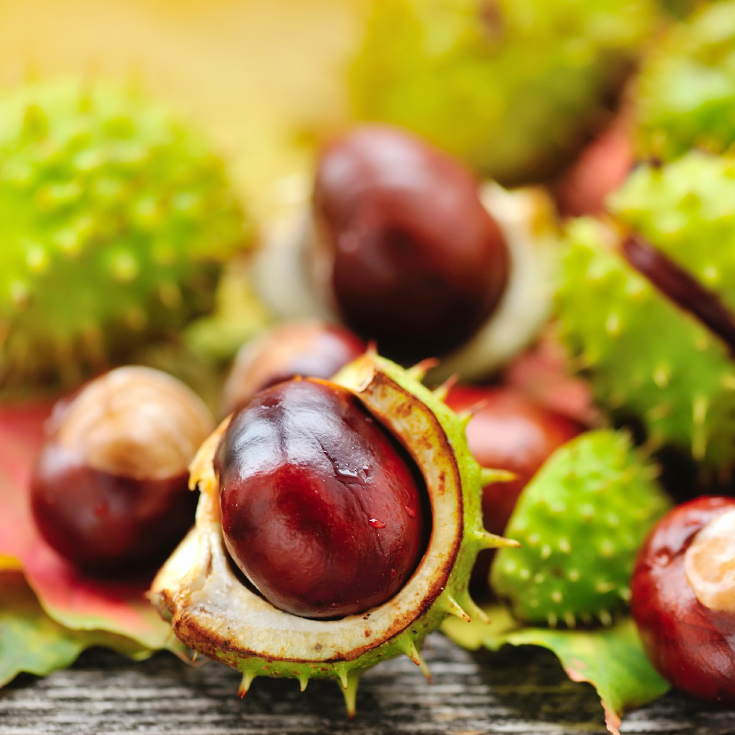For one thing, chestnut trees have nothing to do with sweet chestnuts; They’re a completely different tree, called the Hyacinae, of about 15 recognized species. The European horse chestnut (Aesculus Hippocastanum) is one most commonly used as a supplement and herb.
On the trees, horse chestnuts are encased in a spiky green outer layer that, when ripe, is mistaken by many for the brown fruit of various chestnuts. Although they were once fed to horses as a stimulant and to help keep their fur shiny, horse chestnuts are actually slightly toxic to most animals, except deer and wild boar, which can break down other toxic compounds they contain. Because the fruit of horse chestnut contains a large number of saponins, they are not suitable for human consumption. You may be wondering: What is horse chestnut extract used for? Read on to learn more. And remember: the amount of Horse chestnut extract used in clinical studies may vary. It may range anywhere from two to 50 mg/kg.
Drug for Venous insufficiency
Horse chestnuts have been used for centuries in folk medicine to improve circulation and ease the feeling of heavy legs. The extract contains a number of different compounds including Diosmin and Escin, which can help reduce inflammation and boost sperm counts in males with varicocele-associated infertility. Typically, Diosmin is prescribed to treat symptoms of chronic venous insufficiency. Diosmin and rutin are two reputed plant compounds that can be helpful for venous insufficiency. It is important to consult a health care provider before using horse chestnut in a supplement.
Horse chestnut extract contains rich Aescin, a natural anti-inflammatory compound that has shown promising results in animal studies. It has been shown to reduce the production of inflammatory compounds and suppress neutrophil activation in human cells. It has also been shown to decrease swelling in rat muscle cells. However, further clinical research is needed to confirm this finding. Escin is usually taken orally and is available in the form of tablets or topical gels.
Drugs for reducing blood sugar
Escin is also known to decrease blood sugar levels in mice, making it an important substance to consider for patients with diabetes and obesity. This compound inhibits the activity of enzymes that break down the walls of blood vessels and capillaries, preventing leakage and preserving the structure of capillaries. In rats, daily intake of escin (1.0 mg/kg) reduced tissue breakdown over a period of three weeks. Escin has also been shown to increase blood flow in the gut and reduce inflammation in paralyzed mice.
Drugs for anti-inflammatory
A recently discovered anti-inflammatory agent known as escin has the potential to suppress inflammation. This compound inhibits the deleterious cellular cascade induced by hypoxia, a condition associated with hypertension and other diseases. In a study, horse chestnut escin reduced the number of neutrophils in the blood and the permeability of the blood vessels. The compound also prevents neutrophils from migrating through the basement membrane, an important step in the pathogenesis of inflammation. The active component of escin is PGF2a, a member of the prostaglandin (PG) family, which counteracts the exudation caused by inflammatory mediators. Escin increases PGF2a secretion from vascular endothelial cells, which may explain its anti-inflammatory properties. The escin anti-inflammatory effects have been proven in several animal models. In 1961, intravenous administration of escin reduced edema in a rat paw.
Drugs for varicocele-associated infertility
Escin in horse chestnut, which is not poisonous, is an important part of the treatment for varicocele-associated infertiltility in men. There are four mechanisms that cause varicocele, and aescin is one of them. It raises sperm count in males and improves sperm motility and quality in male patients. It has anti-oxidant properties and targets venous stasis and testicular oxidative stress. Spermatic varicocele has pathological changes such as a thinner venous wall and dysplasia of the venous wall muscles.
Researchers found that men taking horse chestnut extract for two months showed an improvement in sperm motility and quality. The study also found that aescin improved sperm motility and decreased the size of varicocele. The compound may also be helpful in treating chronic venous insufficiency, a problem that affects approximately 40 out of every 100 men.
Skin products
Horse chestnut extract is a powerful ingredient in skincare products. The escin saponin protects the skin’s hyaluronic acid content and complex inhibits another enzyme known as hyaluronidase, which breaks down hyaluronic acid. It has anti-inflammatory, soothing, and toning effects. The horse chestnut oil is gathered in autumn and is used to nourish the skin. Its calming and toning properties make it ideal for sensitive skin.
Clinically horse chestnut extract is used to reduce the swelling and pain of varicose veins. Its antioxidant and anti-inflammatory properties help it prevent venous insufficiency and varicose veins. However, there is no clear evidence that horse chestnut is safe for pregnant women. However, this awesome dietary supplement has legitimate caveats to consider, including possible side effects and drug interactions, as well as dangers to pregnant or lactating women and people with certain health conditions. Thoroughly research these precautions and consult with your healthcare provider before starting a new supplement.



